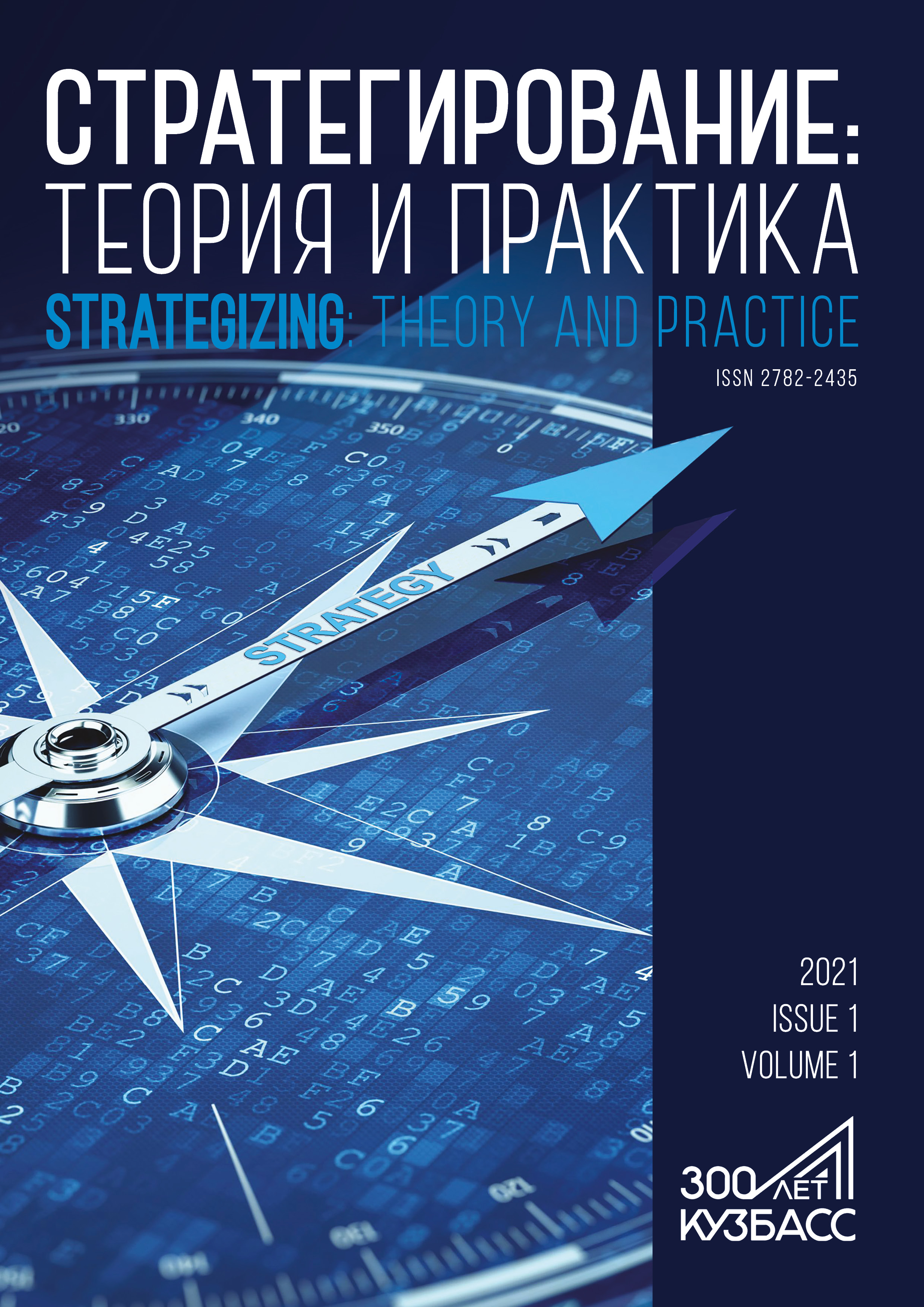Moscow, Moscow, Russian Federation
Student communication communities grant youth perspective to academic, urban, and regional strategizing. They develop a hierarchically organized system of coordinated academic communication strategies across the country and the world. The key strategic goal of youth communication communities is to provide effective strategic communication between students, universities, authorities, and society. They stimulate interdisciplinary research through open discussion and bring together young specialists from different fields of science. In addition, they establish ties between Russian students and foreign student communities, thus initiating intercultural academic cooperation. This research offers a comprehensive solution to various issues of youth communication in an emergency period: a system of youth communication communities to unite young people across cultures in pursuit of the same strategic goals.
strategizing, strategic perspectives, strategic communication, youth communication community, human potential
1. Apelʹ K.-O. Transformatsiya filosofii [Transformation of philosophy]. Moscow: Logos; 2001. 338 p. (In Russ.)
2. Auzan AA, Nikishina EN. Sotsiokulʹturnaya ehkonomika: kak kulʹtura vliyaet na ehkonomiku, a ehkonomika - na kulʹturu [Sociocultural economics: how culture and economy affect each other]. Moscow: Lomonosov Moscow State University; 2021. 200 p. (In Russ.)
3. Belyaev DA, Volkova OA, Shebolkina EP. Potential of cognitive management and value-communicative nature of university education. Higher Education in Russia. 2019;28(2):105-116. (In Russ.) https://doi.org/10.31992/0869-3617-2019-28-2-105-116
4. Blaug M. Metodologiya ehkonomicheskoy nauki, ili Kak ehkonomisty obʺyasnyayut. 2-e izd [Methodology of economic science, or Economists explain. 2nd ed.]. Moscow: Zhurnal Voprosy ehkonomiki; 2004. 415 p. (In Russ.)
5. Borisova TS, Sartakova EE. The living space of modern Russian youth: challenges, problems, opportunities. Tomsk State Pedagogical University Bulletin. 2018;197(8):224-230. (In Russ.) https://doi.org/10.23951/1609-624X-2018-8-224-230
6. Gorshkova MA. Designing the educational system of higher education in modern socio-cultural conditions: Theoretical and methodological aspect. Yalta: RIO GPA; 2020. 136 p. (In Russ.)
7. Zubok YuA, Chuprov VI. Life values in the cultural space of the Russian youth. Research Result. Sociology and Management. 2018;4(3):3-13. (In Russ.) https://doi.org/10.18413/2408-9338-2018-4-3-0-1
8. Zubok YuA, Chuprov VI. Self-regulation of life purpose values in youth cultural space. Bulletin of the Institute of Sociology. 2019;10(4):164-186. (In Russ.) https://doi.org/10.19181/vis.2019.31.4.614
9. Kastelʹs M. Informatsionnaya ehpokha. Ehkonomika, obshchestvo i kulʹtura [The rise of the network society, the information age: Economy, society and culture]. Moscow: GU VSHEH; 2000. 606 p. (In Russ.)
10. Kvint VL. The concept of strategizing. Vol. 1. St. Petersburg: NWIM RANEPA; 2019. 132 p. (In Russ.)
11. Kvint VL. The concept of strategizing. Vol. 2. St. Petersburg: NWIM RANEPA; 2020. 164 p. (In Russ.)
12. Kvint VL. The strategic leadership of Amir Timur: Comments on the Code. St. Petersburg: NWIM RANEPA; 2021. 204 p. (In Russ.)
13. Kvint VL. The global emerging market: strategic management and economics. Moscow: Biznes atlas; 2012. 627 p. (In Russ.)
14. Kiryakova AV, Kargapoltseva NA, Belonovskaya ID. Scientific and pedagogical projections of the transformation of university education. Higher Education in Russia. 2020;29(8-9):155-167. (In Russ.) https://doi.org/10.31992/0869-3617-2020-29-8-9-155-167
15. Kirʹyakova AV, Moroz VV. Diagnosticheskie rakursy universitetskogo obrazovaniya [Diagnostic perspectives of university education]. Sotsialʹno-gumanitarnye innovatsii: strategii fundamentalʹnykh i prikladnykh nauchnykh issledovaniy: Sbornik materialov Vserossiyskoy nauchno-prakticheskoy konferentsii (s mezhdunarodnym uchastiem) [Social and humanitarian innovations: strategies of fundamental and applied scientific research: Proceedings of the All-Russian Research and Practical Conference with foreign participation]; 2022; Orenburg. Orenburg: Orenburg State University; 2022. p. 530-535. (In Russ.)
16. Kozhanova VP, Fomina SN. The importance of youth scientific communities in the professional self-determination of students in schools and university students. Scientific Notes of Russian State Social University. 2018;17(4):100-107. (In Russ.)
17. A conceptual future for the Kuzbass region: Strategic outlines of developmental priorities through 2071, a 50-year perspective. Editor Kvint VL. Kemerovo: Kemerovo State University; 2022. 283 p. (In Russ.) https://doi.org/10.21603/978-5-8353-2812-3
18. Kohanovsky VP. Filosofiya i metodologiya nauki [Philosophy and methodology of science]. Moscow: AST; Rostov-on-don: Feniks; 1999. 574 p. (In Russ.)
19. Kutovaya SV. Interpersonal relations in youth polyethnic communities and their educational opportunities. Values and Meanings. 2015;39(5):89-93. (In Russ.)
20. Nesterova OA. Directions for improvement of the innovative educational system providing comprehensive development of innovative persons. Vestnik Altayskoy akademii ehkonomiki i prava [Bulletin of the Altai Academy of Economics and Law]. 2022;(11-3):483-488. (In Russ.) https://doi.org/10.17513/vaael.2594
21. Nikitenko VN, Solovchenkov SA. On educational opportunities of youth multiethnic communities. The Humanities and Social Studies in the Far East. 2020;17(2):149-153. (In Russ.) https://doi.org/10.31079/1992-2868-2020-17-2-149-153
22. Novikova IV. The concept of employment strategy for the digital economy. Kemerovo: Kemerovo State University; 2020. 254 p. (In Russ.) https://doi.org/10.21603/978-5-8353-2609-9
23. Puzanova ZhV, Larina TI. Influence of university education on changes in students' value orientations. Higher Education in Russia. 2021;30(4):99-111. (In Russ.) https://doi.org/10.31992/0869-3617-2021-30-4-99-111
24. Kiryakova AV, Kargapoltseva NA, Belonovskaya ID, Duzhnikov SA. Development of youth communities in the university ecosystem: Resources, projects, and risks. Higher Education in Russia. 2022;31(8-9):116-136. (In Russ.) https://doi.org/10.31992/0869-3617-2022-31-8-9-116-136
25. Tutov LA, Shulevsky NB. Istoriya i filosofiya nauki dlya aspirantov ekonomicheskikh fakultetov universitetov [History and philosophy of science for graduate students of economic faculties and universities]. Moscow: MAX Press; 2010. 261 p. (In Russ.)
26. Kiryakova AV, Kargapoltseva NA, Belonovskaya ID, Duzhnikov SA. University as an environment of innovative interactions. Higher Education in Russia. 2021;30(8-9):115-124. (In Russ.) https://doi.org/10.31992/0869-3617-2021-30-8-9-115-124
27. Khvorostyanaya AS. Strategizing Singapore's creative economy: experience in workforce development. Economics of Sustainable Development. 2023;54(2):136-140. (In Russ.)
28. Khvorostyanaya AS. Strategizing of the creative economy youth innovation ecosystem national brands (South Korean experience). Administrative Consulting. 2023;171(3):46-56. (In Russ.) https://doi.org/10.22394/1726-1139-2023-3-46-56
29. Tsivilev SE. Strategic priorities of Kuzbass region development & management of its implementation. St. Petersburg: IPTS SZIU; 2021. 52 p. (In Russ.)
30. Chuprov VI. Self-regulation of the youth life in cultural space: The concept of socio-cultural mechanism. Humanities of the South of Russia. 2018;7(4):13-25. (In Russ.) https://doi.org/10.23683/2227-8656.2018.4.1
31. Kvint V. The Global Emerging Market: Strategic Management and Economics. New York: Routledge; 2009. 488 p. https://doi.org/10.4324/9780203882917





